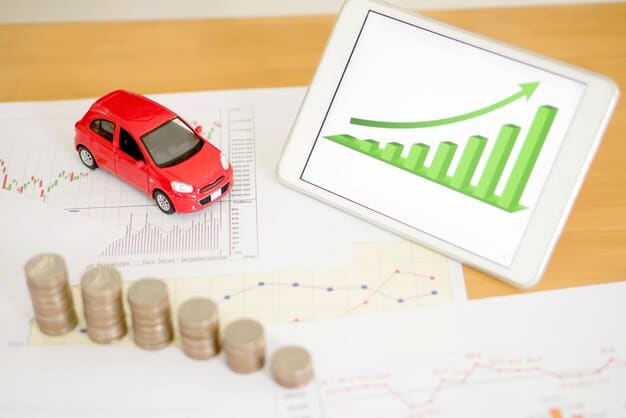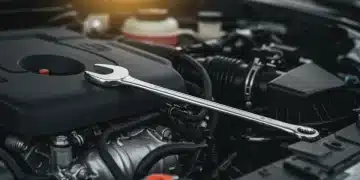Car Buying Guide 2025: Depreciation & Resale Value Secrets

Car Buying Guide 2025 emphasizes understanding the depreciation curve and its significant impact on resale value, providing essential strategies for making informed decisions to maximize your investment and minimize long-term financial loss.
Navigating the car market in 2025 requires a keen understanding of depreciation and its effects on resale value. Our Car Buying Guide 2025: Understanding the Depreciation Curve and Its Impact on Resale Value provides the insights you need to make smart purchasing decisions.
Decoding Depreciation: A 2025 Car Buyer’s Essential Guide
Depreciation is often the elephant in the room when buying a car. It’s the rate at which your vehicle loses value over time, and understanding it is crucial for making a sound financial decision. Factors like make, model, market demand, and even color can play a significant role in how quickly a car depreciates.
In the 2025 car market, with the rise of electric vehicles (EVs) and rapidly changing technology, understanding the depreciation curve is more important than ever. Let’s dive into the key aspects.
What is Depreciation?
Simply put, depreciation is the decrease in a car’s value from when it’s brand new to its value after a certain period of ownership. It’s an inevitable part of car ownership, but you can minimize its impact by choosing the right vehicle and taking good care of it.
Factors Influencing Depreciation in 2025
Several factors contribute to a car’s depreciation rate. These include the vehicle’s brand reputation, reliability, fuel efficiency, and the overall demand for the model. Market trends, like the increasing popularity of SUVs and EVs, also play a significant role.
- Brand Reputation: Some brands hold their value better than others due to their perceived quality and reliability.
- Fuel Efficiency: With fluctuating gas prices, fuel-efficient vehicles tend to depreciate less.
- Market Trends: The demand for certain types of vehicles, like SUVs and crossovers, can significantly impact their depreciation rates.
- Technological Advancements: Cars with the latest technology often hold their value better, but rapid advancements can also cause older tech to depreciate faster.

Understanding these factors is key to making an informed decision when buying a car in 2025. By considering how these elements influence depreciation, you can choose a vehicle that holds its value better over time.
Top Cars for Resale Value in 2025
Choosing a car with a strong resale value is like investing in a piece of equipment that gives back in the long run. Certain brands and models are known for holding their value exceptionally well, giving you a better return when you decide to sell or trade in your vehicle.
In 2025, several cars stand out regarding resale value. These vehicles often share characteristics like reliability, strong brand reputation, and high demand. Let’s look at some top contenders.
SUVs and Trucks
SUVs and trucks consistently rank high in resale value. Their versatility and durability make them attractive to a wide range of buyers, contributing to their strong market demand.
Sedans and Hatchbacks
While SUVs dominate the resale market, some sedans and hatchbacks also perform well. These cars often excel in fuel efficiency and affordability, appealing to budget-conscious buyers.
- Toyota Tacoma: Known for its reliability and off-road capabilities, the Tacoma consistently holds its value.
- Jeep Wrangler: The Wrangler’s iconic design and off-road prowess make it a popular choice for outdoor enthusiasts.
- Subaru Impreza: Fuel efficiency and standard all-wheel drive help the Impreza maintain its value.
When selecting a car for its resale value, it’s essential to research specific models and years. Consider factors like mileage, condition, and maintenance history, as these can significantly impact the vehicle’s worth. By choosing a car with a proven track record for resale value, you can minimize your financial losses down the road.
The Impact of Mileage and Condition on Resale Value
Mileage and condition are two of the most significant factors that affect a car’s resale value. A car with high mileage and poor condition will depreciate faster than a well-maintained vehicle with low mileage. Understanding this can guide you in making smart choices during ownership.
Maintaining your car and keeping mileage in check are essential for preserving its value for the future. Let’s examine these factors in more detail.
Managing Mileage
Mileage is a direct reflection of how much a car has been used. Higher mileage typically translates to more wear and tear, leading to a lower resale value.
Maintaining Condition
A well-maintained car is more appealing to potential buyers. Regular servicing, cleaning, and addressing any minor issues promptly can make a significant difference.
- Regular Servicing: Following the manufacturer’s recommended service schedule can prevent major mechanical issues.
- Cosmetic Care: Keeping the car clean and addressing any scratches or dents can improve its appearance.
- Prompt Repairs: Addressing any mechanical or electrical issues promptly can prevent them from escalating.
By actively managing mileage and condition, you can significantly improve your car’s resale value. Taking care of your vehicle not only enhances your driving experience but also protects your investment for the future.
Electric Vehicles (EVs) and Their Depreciation Curve
Electric vehicles (EVs) are becoming increasingly popular, but their depreciation curve can be different from traditional gasoline-powered cars. Factors like battery health, technology advancements, and government incentives play a significant role in how EVs hold their value.
Understanding the depreciation dynamics of EVs is crucial for anyone considering purchasing an electric car in 2025. Let’s explore the unique aspects of EV depreciation.
Battery Health and Replacement Costs
The battery is the most expensive component of an EV, and its health directly impacts the car’s value. Over time, batteries degrade, reducing their range and performance.
Technological Advancements
The rapid pace of technology in the EV industry can also impact depreciation. Newer EVs often come with improved battery technology, increased range, and advanced features.
- Battery Technology: Advancements in battery technology are constantly improving the range and lifespan of EVs.
- Government Incentives: Tax credits and rebates can lower the initial cost of an EV, but they can also impact resale value.
- Charging Infrastructure: The availability of charging stations can influence the demand for EVs.

As the EV market continues to evolve, understanding these factors is essential for making informed purchasing decisions. By staying informed about battery technology, government incentives, and charging infrastructure, you can better manage the depreciation of your electric vehicle.
Negotiating the Best Price to Offset Depreciation
Negotiating the best price when buying a new or used car can significantly offset the impact of depreciation. The lower the initial price, the less money you stand to lose as the car depreciates over time. Effective negotiation skills can help you secure a better deal.
Knowing how to negotiate effectively can be a valuable tool in minimizing the financial impact of depreciation. Let’s look at some key strategies.
Research and Preparation
Before heading to the dealership, do your homework. Research the market value of the car you’re interested in and understand the dealer’s incentives.
Timing Your Purchase
The time of year can also influence your negotiating power. Dealers are often more willing to offer discounts at the end of the month, quarter, or year to meet sales quotas.
- End of the Month: Salespeople often try to meet monthly quotas, making them more willing to negotiate.
- End of the Year: Dealerships are eager to clear out old inventory to make room for new models.
- Be Willing to Walk Away: Don’t be afraid to walk away if the dealer isn’t willing to meet your price.
By implementing these negotiation strategies, you can secure a better deal and minimize the impact of depreciation. A well-negotiated purchase price is a crucial step in protecting your investment.
Long-Term Ownership Strategies to Maximize Resale Value
Maximizing a car’s resale value isn’t just about the initial purchase; it’s also about how you care for the car throughout your ownership. Implementing long-term strategies can help preserve the car’s value and ensure a better return when you decide to sell or trade it in.
Let’s explore some of the best long-term ownership strategies for preserving your car’s value.
Consistent Maintenance
Regular maintenance is critical for keeping your car in top condition. Following the manufacturer’s recommended service schedule and addressing any issues promptly can prevent major problems.
Careful Driving Habits
How you drive your car also impacts its long-term value. Avoiding aggressive driving, such as hard acceleration and braking, can reduce wear and tear on the engine and other components.
- Keep Records: Document all maintenance and repairs.
- Store Properly: Protect your vehicle from the elements.
- Address Issues Promptly: Small problems can become big ones if left unattended.
By implementing these long-term ownership strategies, you can maximize your car’s resale value and ensure a better return on your investment. A well-maintained and carefully driven car will always be more appealing to potential buyers.
| Key Point | Brief Description |
|---|---|
| 📉 Understanding Depreciation | Knowing how cars lose value helps in smart buying. |
| 🚗 Choosing Resale Value | Pick models known for holding their value well. |
| 🛠️ Maintaining Condition | Keep your car in top shape with regular servicing. |
| ⚡ EVs and Depreciation | EV depreciation involves factors like battery health. |
Frequently Asked Questions
▼
The depreciation curve is the rate at which a car loses its value over time. In the first year, a new car typically depreciates the most, and then the rate slows down in subsequent years.
▼
Brands like Toyota, Subaru, and Jeep consistently rank high in resale value due to their reliability, durability, and strong brand reputation.
▼
Higher mileage typically translates to more wear and tear, leading to a lower resale value. Keeping mileage in check helps preserve the car’s value.
▼
Regular maintenance is critical for keeping your car in top condition. Following the manufacturer’s recommended service schedule can prevent major problems.
▼
EVs can be a good investment, but it’s crucial to understand their depreciation dynamics, including battery health, technology advancements, and government incentives.
Conclusion
Understanding the depreciation curve and its impact on resale value is crucial for making informed car-buying decisions in 2025. By considering factors like brand reputation, fuel efficiency, maintenance, and long-term ownership strategies, you can choose a vehicle that holds its value and protects your investment.





